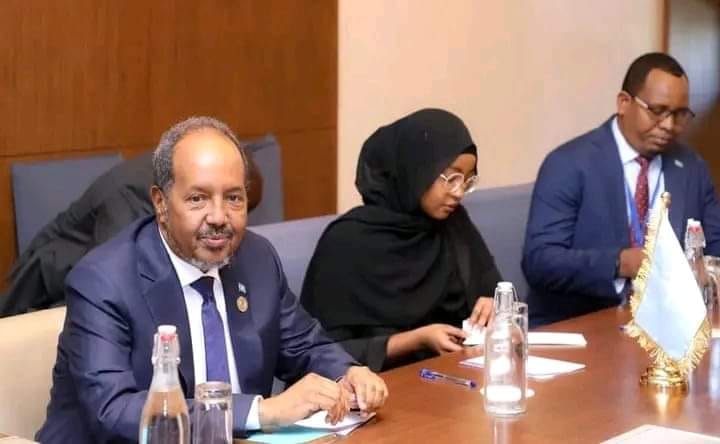MOGADISHU (KAAB TV) – In a stunning revelation that encapsulates the depths of corruption and nepotism plaguing Somalia, the nation’s sports ministry is facing a public outcry after fielding a novice 100m sprinter, Nasra Abubakar Ali, in the World University Games in China this week.
The move raised eyebrows not only due to Ali’s lackluster performance, which saw her taking nearly twice the time of the winner to complete the race, but also due to her startling familial ties to Khadijo Aden Dahir, the head of the country’s athletics.
Nasra’s presence in the race, it turns out, is emblematic of a wider pattern of favoritism and self-serving practices that extend to the highest echelons of power in the country.
As video footage of the event circulated, depicting Nasra falling far behind her competitors and eventually finishing the race with a seemingly carefree skip, the scandal deepened: she is not even an athlete and never attended any training as verified by the Minister of Youth and Sports, Abdifatah Barre.
The #Somali Government sent ‘an athlete’ to represent the nation. Problem was that the ‘sprinter’ has never ran before.
We later found out ‘the athlete’ is actually the niece of Somalia’s Head of Athletics Fed. No wonder – the Somali Govt is the most corrupt in the world. pic.twitter.com/1gW7SzTTGP
— Jamal Osman (@JamalMOsman) August 2, 2023
But how was she selected for the competition?
Nasra is, in fact, the niece of Khadijo Aden Dahir, the head of Somali Athletic Federation who picked Nasra for the competition in China.
This has sparked public outrage and the sports ministry suspended Khadijo and pledged to investigate how such a glaring incident occurred.
However, the scandal surrounding Nasra’s participation is merely the tip of the iceberg.

Observers and citizens alike are drawing chilling parallels between the nepotism entrenched in the country’s sports sector and the blatant corruption that has infiltrated the highest levels of government.
Many view Khadijo’s actions as emblematic of a larger trend where influential figures, including President Hassan Sheikh Mohamud and his immediate family, exploit their positions for personal gain.
President Mohamud has himself come under intense scrutiny for allegedly using his authority to secure lucrative government positions and contracts for his family members, including his daughter Jihan Hassan Sheikh Mohamud and his son’s wife Hawo Hassan.
Both were awarded high-profile government roles and contracts, despite their apparent lack of relevant qualifications or experience.
The president’s brothers, Hussein Sheikh Mohamud and Ali Sheikh Mohamud, also reportedly benefiting from military fuel supply and car plate registration contracts.
And it does not stop there: the president’s two wives have found their places, with Qamar Ali positioned as a shareholder in the AirArabia airline, a conduit between Mogadishu and Dubai, while the other co-wife’s fortunes soar through the acquisition of the military food supply contract, reaping millions from the government’s coffers courtesy of the international budget support offered by the World Bank.
Meanwhile, Sahro Omar, the second co-wife, navigates the skies of intrigue as the proprietor of shares in FlyDubai, an UAE-based airline that has recently inaugurated direct flights between Mogadishu and Dubai.
The widespread nature of corruption has prompted a public outcry for urgent action against the rampant corruption and nepotism. Many have demanded accountability from the Somali government, decrying the prevalence of corrupt officials who mimic the president’s alleged practices.
The sentiments of the public echo through social media and conversations across the nation. Mohamed Abdinasir, a university student, captured the collective frustration, referring how the country ended up having a bad athlete.
“He [president Mohamud] is the master of corruption. If he stops perhaps others will be ashamed. We have the most corrupt president in the most corrupt country and now we ended up having the worst runner.”
With the nation’s integrity on the line, experts and concerned citizens are advocating for a renewed commitment to transparency and accountability.

Abdirashid Khalif, a researcher and former director of the Heritage Institute, urged the president to reconsider the implications of his actions.
“Since people are justifying your daughter whom you gave a job in your office – every day there is a leader who is giving his family a job – and they say the President has legalized it,” he said.
He was referring to last month’s announcement by the Minister of Commerce Jibril Abdirashid Haji who boldly declared his intention to hire additional family members if the chance arose following a parliamentary inquiries into the employment of around 10 of his relatives within his ministry, drawing substantial salaries.
“I recommend you: Apologize to Somalis for your words about your family members and their employment; let your daughter go; it is not good to keep her in the mouth of the people; it is not good for you,” Khalif wrote.
As Somalia grapples with the repercussions of this alarming scandal, the nation stands at a crossroads, faced with a pressing need for a comprehensive overhaul of its governance systems and a renewed commitment to serving the interests of its citizens rather than exploiting them for personal gain.


